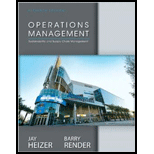
Concept explainers
a)
To determine: Thesequence of jobs that are based on decision rule First Come First Served (FCFS).
Introduction: First Come First Served is the
b)
To determine: The sequence of jobs based on decision rule Shortest Processing Time (SPT).
Introduction: Shortest Processing Tine is the scheduling rule, which helps to arrange the sequence in the order. Here, job with the shortest duration would be served first. Then, the process would go on from the shortest to largest duration.
c)
To determine: The sequence of jobs based on decision rule Longest Processing Time (LPT).
Introduction: Largest Processing Tine is the scheduling rule, which helps to arrange the sequence in the order. Here, job with the largest duration would be served first. Then, the process would go on from the largest to shortest duration.
d)
To determine: The sequence of jobs based on decision rule Earliest Due Date (EDD).
Introduction: Earliest Due Date is the scheduling rule, which helps to arrange the sequence in the order. Here, job with the earliest due date would be served first. Then, the process would go on from the earliest due date to latest due date.
e)
To determine: The sequence of jobs based on critical ratio.
Introduction: Critical ratio is kind of scheduling rule that helps to identify that, the task or job is on the correct track. It would help to identify if the task is behind or ahead of the schedule.
Want to see the full answer?
Check out a sample textbook solution
Chapter 15 Solutions
Operations Management
- Negotiators can gain several benefits from using the strategy of multiple equivalent simultaneous offers. By offering multiple options it reduces the chance of rejection. It also improves the chances of reaching reaching an agreement. By presenting multiple offers, it shows you are flexible. disagree with this post or add on to the postarrow_forwardThe strategy of Multiple Equivalent Simultaneous Offers involves presenting several equally valuable options to the other party during negotiations. This approach benefits negotiators by creating flexibility and increasing the chances of finding a mutually agreeable solution. By offering multiple options, negotiators show that they are open to compromise, which can build trust and make the negotiation process smoother. It also helps avoid getting stuck on one issue, as the other party can choose from several alternatives that meet their needs. In my experience, using MESOs in a work negotiation helped both parties reach an agreement more quickly because each option was carefully thought out to address different needs, and this made it easier for us to settle on one that worked for both sides. This strategy can also reveal what is most important to the other party, helping negotiators understand their priorities better. agree or disagree with the postarrow_forwardExamine the conflicts between improving customer service levels and controlling costs in sales. Strategies to Balance Both customer service levels and controlling costs in sales 1.Outsourcing and workforce optimization 2. AI-driven customer supportarrow_forward
- how can you gain trust in a negotiation setting?arrow_forward✓ Custom $€ .0 .on File Home Insert Share Page Layout Formulas Data Review View Help Draw Arial 10 B B14 ✓ X✓ fx 1400 > 甘く 曲 > 冠 > Comments Editing ✓ . . . P Q R S T 3 A Production cost ($/unit) B с D E F G H J K L M N $74.00 4 Inventory holding cost ($/unit) $1.50 5 Lost sales cost ($/unit) $82.00 6 Overtime cost ($/unit) $6.80 7 Undertime cost ($/unit) $3.20 8 Rate change cost ($/unit) $5.00 9 Normal production rate (units) 2,000 10 Ending inventory (previous Dec.) 800 11 Cumulative 12 13 Month Demand Cumulative Demand Product Production Availability Ending Inventory Lost Cumulative Cumulative Product Sales 14 January 1,400 1,475 15 FUERANZ222222223323333BRUINE 14 February 1,000 2,275 Month January February Demand Demand Production Availability Ending Inventory Lost Sales 1,400 #N/A 1,475 #N/A #N/A #N/A 1,000 #N/A 2,275 #N/A #N/A #N/A 16 March 1,800 2,275 March 1,800 #N/A 2,275 #N/A #N/A #N/A 17 April 2,700 2,275 April 2,700 #N/A 2,275 #N/A #N/A #N/A 18 May 3,000 2,275 May 3,000 #N/A…arrow_forwardFollow guidelines and summarize in a paragrapharrow_forward
 Practical Management ScienceOperations ManagementISBN:9781337406659Author:WINSTON, Wayne L.Publisher:Cengage,
Practical Management ScienceOperations ManagementISBN:9781337406659Author:WINSTON, Wayne L.Publisher:Cengage, Foundations of Business (MindTap Course List)MarketingISBN:9781337386920Author:William M. Pride, Robert J. Hughes, Jack R. KapoorPublisher:Cengage Learning
Foundations of Business (MindTap Course List)MarketingISBN:9781337386920Author:William M. Pride, Robert J. Hughes, Jack R. KapoorPublisher:Cengage Learning Foundations of Business - Standalone book (MindTa...MarketingISBN:9781285193946Author:William M. Pride, Robert J. Hughes, Jack R. KapoorPublisher:Cengage Learning
Foundations of Business - Standalone book (MindTa...MarketingISBN:9781285193946Author:William M. Pride, Robert J. Hughes, Jack R. KapoorPublisher:Cengage Learning


